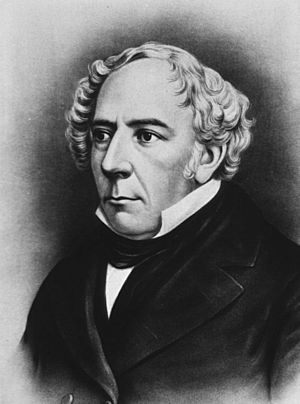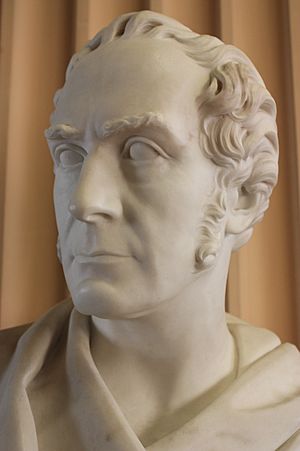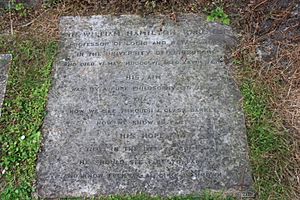Sir William Hamilton, 9th Baronet facts for kids
Quick facts for kids
William Hamilton
|
|
|---|---|
 |
|
| Born | 8 March 1788 Glasgow, Scotland
|
| Died | 6 May 1856 (aged 68) Edinburgh, Scotland
|
| Era | 19th-century philosophy |
| Region | Western philosophy |
| School | Common sense realism |
|
Main interests
|
Metaphysics, logic |
|
Influences
|
|
|
Influenced
|
|
| Signature | |
Sir William Hamilton, 9th Baronet (born March 8, 1788 – died May 6, 1856) was a Scottish thinker who studied how we think and understand the world. He is sometimes called William Stirling Hamilton, using his mother's family name.
Contents
Early Life and Learning
Growing Up in Glasgow
William Hamilton was born in Glasgow, Scotland, in a family of academics. His father, Professor William Hamilton, was a professor of anatomy. Sadly, his father died when William was very young, in 1790. William and his younger brother, Thomas, were raised by their mother.
School Days and University
William went to Glasgow Grammar School. He also spent two years at a private school in England. In 1807, he went to Balliol College at Oxford University. He did very well in his studies and earned his first degree in 1811.
He was first planning to become a doctor. However, he changed his mind after leaving Oxford. In 1813, he became a lawyer in Scotland.
Becoming a Baronet
William spent much of his life studying and developing his own ideas about philosophy. He was able to prove that he belonged to an old family called Hamilton of Preston. In 1816, he took on the title of Baronet, which had not been used for a long time.
Becoming a Philosopher
Exploring German Ideas
William Hamilton visited Germany twice, in 1817 and 1820. These trips made him very interested in German language and philosophy. At that time, British universities did not pay much attention to German thinkers.
In 1820, he tried to become a professor of moral philosophy at the University of Edinburgh. However, he did not get the job.
Teaching History
In 1821, he became a professor of civil history. He taught about the history of modern Europe and literature. The salary for this job was not much, and it eventually stopped. Because of this, fewer students attended his classes, and he stopped teaching when the salary ended.
In 1827, his mother, whom he cared for deeply, passed away. In 1828, he married his cousin, Janet Marshall. Around this time, he moved to a new house in Edinburgh.
Later Life and Death
Sir William Hamilton died on May 6, 1856. He was buried in St John's Episcopal Churchyard in Edinburgh. His son, Sir William Stirling-Hamilton, who became a general in the British Army, took over his title.
His Ideas and Influence
Understanding How We Think
Sir William Hamilton did not create many completely new ideas. However, he encouraged his students to think critically. He believed that understanding how our minds work (psychology) was very important. He also helped introduce German philosophy, especially the ideas of Immanuel Kant, to Britain.
One of his most important ideas was called "Philosophy of the Unconditioned." This idea suggests that the human mind has limits. We cannot fully understand things that are "infinite" or "absolute" (like endless time or space). He believed that to think about something means to put limits on it.
Faith and Knowledge
Hamilton thought that because our minds cannot fully grasp the infinite, there is a place for faith. He believed that faith helps us understand things that our logic cannot. He also thought that we naturally believe that objects exist outside of our minds, just as we see them.
Logic and Reasoning
Hamilton saw logic as a way of understanding how thoughts are connected, not as a way to discover new facts. He believed that logic helps us make sure our ideas are consistent.
He is also known for an idea called "quantification of the predicate." This is a complex idea in logic. It suggests that when we say "All A is B," we might mean "All A is *some* B" or "All A is *all* B." However, many later thinkers disagreed with this idea.
Studying Ancient Thinkers
Hamilton greatly admired the ancient Greek philosopher Aristotle. He studied Aristotle's works deeply. He also read many old and medieval writings about philosophy. He enjoyed finding forgotten thinkers and giving them credit for their ideas. He also studied modern German philosophy, even if he didn't always agree with it.
Beyond Philosophy
Sir William Hamilton was interested in many subjects, not just philosophy. He studied anatomy and how the body works. He also loved ancient and modern literature, especially from the 16th and 17th centuries. He had a large library, which later became part of the University of Glasgow's library.
Focus on Education
Hamilton was very interested in education, both as a teacher and a writer. He had strong ideas about how people should be taught. He believed in certain methods of education that became widely accepted. However, he famously did not think that studying mathematics was the best way to train the mind, which caused some debate. As a teacher, he was dedicated and successful. His writings about how universities should be organized had a big impact at the time.
His Published Works
After he died, his lectures were published as "Lectures on Metaphysics and Logic" in four volumes. His notes on the works of another philosopher, Thomas Reid, were also published. A book about his life, "A Memoir of Sir W. Hamilton," was written by John Veitch in 1869.
 | Chris Smalls |
 | Fred Hampton |
 | Ralph Abernathy |



